Giving thanks for nothing this holiday
November 6, 1995
Think ahead with me, if you will, to Thanksgiving day — before you’ve fallen asleep in the la-z-boy watching football, before you’ve stuffed your face with absurd helpings of mashed potatoes and turkey, back before you’ve even ecstatically tucked in your napkin and snatched up your silver. I would like you to think to when your family will bow their heads to return thanks. To whom or what will you give thanks?
Every person has his religion, whether he admits it or not. Whether it be Islam, New Age, Christianity, Buddhism, secular humanism, etc., everyone dons a pair of “rose-colored glasses,” if you will, with which he interprets the world around him. Every person, essentially, adopts a “world-view.”
If we are to be truly honest with ourselves, we must concede that though most of our culture verbally assents to a God (for example, our nation’s motto on our currency still reads, “In God we trust”), every such affirming action and thought is now being replaced with the new “status quo,” inferring that life really is devoid of ultimate meaning — we are essentially products of random chance, not an intelligent designer. We are evolving from “All have been endowed by their Creator with certain unalienable rights,” to “All have been endowed by a chance fluke with meaninglessness.”
Those who deny this conclusion must get off the fence. What do I mean? Let me illustrate. Imagine that you are a member of the local police, and your unit has just been dispatched to coax to safety a suicidal woman about to plunge to her bloody death from her sixth story window. Your squad car screeches to a halt at the scene, you jump out, hurriedly switch on your megaphone, and thrust it to your mouth. As the woman agonizes over the cold, unwelcoming pavement below, she slowly turns her head in your direction. Her eyes beckon for one last word of solace, and you are faced with the moment of truth. However, you are a card-carrying atheist. Your god is chance. What do you say to her? Do you tell her the truth (according to your creed)? “Your life was a biological, purposeless hoax orchestrated by a great, random nothing. Should you choose to jump, please take into consideration that littering is a $50 fine.”
Or do you rather lie, and shout, “Don’t jump! Your life does have meaning — don’t throw it away!”?
Again, what about right and wrong? What is really so bad about rape and murder anyhow? The atheist might counter, “But sir, I know it’s wrong!”
Why, though? “Well… because I just feel it,”he replies. If feelings alone, be they individual or collective, could be the ultimate umpire in the game of morality, who has the right to say that the Third Reich was wrong? The guy with the biggest guns?
And what’s the big fuss over international human rights? One modern philosopher once said, “In some cultures, they love their neighbors; in other cultures, they eat them, both on the basis of feeling. Do you have any preference?”
If it’s “majority rules” that dictates right and wrong, why then should we impose our standard of human rights on China (pop. one billion plus)? Again, O American atheist, I encourage you to get off the fence.
You see, our founding fathers had it right. They understood that man was made in the image of God, thus mankind has meaning. Surely one does not assign meaning to a haphazardly strewn pile of nuts and bolts, but to a car — now that’s a different story. Cars were made to be driven, and likewise, men and women were created for the Creator’s purpose. “You are worthy, O Lord, to receive glory and honor and power: for you have created all things, and for your pleasure they were and are created.” (Revelation 4:11)
The point here is not to argue that an atheist should bow his head this Thanksgiving before scarfing down the holiday fowl, but rather to expose his intellectual schizophrenia. He can’t give us a sound answer as to why life is of significant value, much less why our citizens are endowed with any rights. If we side with the atheist, let us, in the words of the apostle Paul, “eat and drink, for tomorrow, we die.” (1 Cor. 15:32)
You can’t have your turkey and eat it, too. Either we concede that there is a God to be thanked for all there is and all we have, or we embrace ethical anarchy, deny life’s meaning, and pray, “Thanks for nothing.”
Michael J. Ives is a freshman in Liberal Arts and Sciences at Iowa State University.






